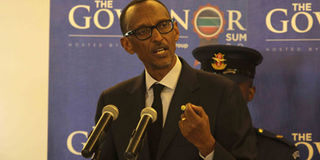Kenya has plenty to learn from Rwanda’s model of development

PHOTO | SULEIMAN MBATIAH Rwandan President Paul Kagame fielding questions at The Governors' Summit 2014 at Great Rift Valley Lodge in Naivasha on January 20, 2014. For in the 20 years since genocide, Rwanda has rebuilt from the scratch, building infrastructure, schools, healthcare, and social safety nets for the poor.
What you need to know:
- Rwanda’s starting point, in fact, was more like that of Guinea, where the French left in a huff, taking bulbs and pulling out sockets from the walls, angry that Sekou Toure had refused to delay his demands for independence.
- President Kagame may ultimately change the constitution to stay on, but that will have a negative impact on his legacy and the sense of certainty that constitutions bring, which could increase disaffection in some quarters.
It may seem strange to ask 50-year-old Kenya, to look to Rwanda, barely 20 years old since the genocide, for lessons on development and progress.
But it should. For in the 20 years since genocide, Rwanda has rebuilt from the scratch, building infrastructure, schools, healthcare, and social safety nets for the poor.
I was in Rwanda last week, and Kigali sparkles: well lit, clean and immaculate, secure and maintained in a neat and smart way that builds pride and confidence. And it’s not just Kigali. I travelled to the south and the countryside is just as clean and organised.
Let’s not underrate the impact of cleanliness and beauty on our psyche. Ms Wanini Kireri, now Nairobi County Prisons Commander, was a pioneer of cleanliness and neatness as an indispensable first step in reforming the prisons she was in charge of.
When she took over Shimo la Tewa Prison in 2009, the first woman to head a maximum security male prison in Kenya, the first thing she did was order a clean-up, painting and beautifying of the prison.
It immediately had a calming effect, and was crucial to helping improve the relationship between prison officers and prisoners, so that the warders were not always on edge. It also helped facilitate dialogues and discipline with prisoners making the introduction of reformist skills that could be used by prisoners after release easy.
The transformation of Rwanda is more amazing because there was no template for the country that had lost about 1 million people to genocide and about another 3 million in exile following the end of the genocide. Its starting point was not like ours in 1963 which had structures, international support, and some human resources.
Rwanda’s starting point, in fact, was more like that of Guinea, where the French left in a huff, taking bulbs and pulling out sockets from the walls, angry that Sekou Toure had refused to delay his demands for independence.
It started from the negative: There was a war of insurgency against the victorious RPF regime, a clumsy international response to the humanitarian crisis wrought by genocide, and a population riven with trauma, guilt and division.
Rwanda could also teach us a lesson or two about dealing with corruption. Corruption is not tolerated in Rwanda, from the top down. It is almost unheard of for policemen or government officials to seek bribes. And ministers have been jailed for seeking kickbacks.
There is a sense of security that pervades every part of the country. Major violent crimes like bank robberies are rare and one of my friends working with the UN remarked that he had never seen a security alert from UN security in all his two years in Rwanda!
It takes just a few hours to register a business in Rwanda and now this has been taken online so that anyone can start a business quickly and for no charge!
Of course Rwanda has its challenges, and some quite serious, too. For one, President Paul Kagame — the glue and engine of post-genocide Rwanda — is due to step down in 2017.
There is no clear successor — as Thabo Mbeki was for Nelson Mandela — and political institutions are weak. President Kagame may ultimately change the constitution to stay on, but that will have a negative impact on his legacy and the sense of certainty that constitutions bring, which could increase disaffection in some quarters.
Second, the trauma and impact of the genocide remains strong despite efforts at justice and reconciliation. Indeed, this is often given as the reason for the tight control the regime has over every aspect of life in Rwanda, which can be stifling.
If Rwanda could let freedom ring, allowing for peaceful dissent and challenge, while ensuring that it was not ethnic based, it will go very far. And maybe keep teaching us about progress.





